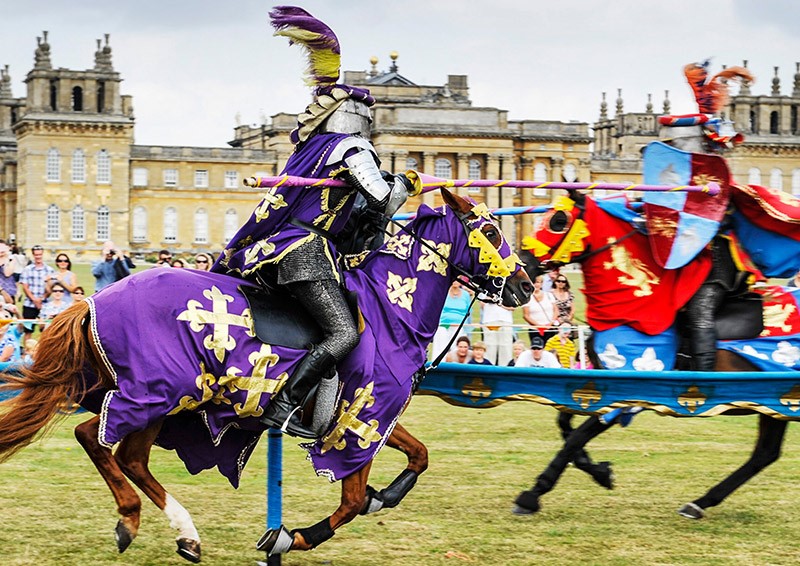Editor’s note: this is for Serena Chrystie Roberson to brighten your day.
Note to Readers: This is a satirical story and any reference to characters, living, or dead is purely coincidental.
The story begins in the early years,1347, in the Duchy of Grand Fallwick, a small monarchy located close to the border shared by France and Switzerland. As far as the Duchy’s society goes, it is replete with the usual class structure of the time, nobility, warriors, high priests, merchants and peasants.
As a rule, the Duchy’s day-to-day operation is quite peaceful, only interrupted by an occasional peasant squabble over livestock and farming issues. Keep in mind that the peasants, or serfs, worked to the support of the monarchy and the noble court, held no title to the land they labored on, and were generally at the mercy and dictates of the Monarchy.
One day, the Monarchy, upon the advice of their out-of-Duchy consultants, decides to construct a new Jousting field, related Infirmary, and Banquet hall. In addition to a site for the improvements, which wasn’t a problem since the monarchy owned all of the land in the Duchy, the Monarchy also needed some shekels. The Royal treasury was operating at a deficit, and to make matters worse, it had recently been discovered that the crown jewels were mere costume jewelry. So, a call was sent throughout the land that the serfs would have to buck up and work harder to fund the project. Now, the serfs were already just scraping by and barely able to feed their families, but that didn’t matter to the Monarchy. At this point, the Monarchy put on a full court PR media blitz, including the Festival of the Bulls, or what was commonly referred to as, “The Line of Bull”, in order to convince the peasants that the project was in their best interests.
The merchants got on board when the Monarchy explained that they would have a greater number of spectators to sell their famous bologna kabobs and spam fritters to with the new facilities. Of course, the Court of Jesters, the main advisory board to the Monarchy, firmly, and without exception, endorsed the project. One of the ranking knights of the Square Table reported to the Monarchy that he knew something about construction costs because he had a relative in a neighboring kingdom who was a contractor. So, off the Monarchy went, hell bent for leather.
Besides the requirement that the serfs would have to work harder to raise the necessary capital, the land that the Monarchy and their consultants wanted to use, was land farmed by the peasants, and would now be taken out of production, without CRP payments, for the new facilities.
To facilitate the new Jousting Field, the out-of-Duchy consultants convinced the Monarchy that the elaborate historic manor house gardens would be better served as a steed stable
and the existing horticultural engineers could be charged with shoveling something else besides top soil. Oh, and the reflecting pool was to become a giant horse trough and the carved stone fountains could serve as relief stations for the jousting tournament crowds.
Needless to say, what occurred next was a mild insurrection complete with pitch forks and torches, which confirms what Sophocles once said – “No enemy is worse than Bad Advice”.
Needless to say, what occurred next was a mild insurrection complete with pitch forks and torches, which confirms what Sophocles once said – “No enemy is worse than Bad Advice”.
Check your local movie theater for the premier of the film, or for a live performance near you.



From Benjamin Franklin:
“An investment in knowledge pays the best interest.”
“Necessity never made a good bargain.”
“Democracy is two wolves and a lamb voting on what to have for lunch. Liberty is a well-armed lamb contesting the vote!”
“We are all born ignorant, but one must work hard to remain stupid.”
From James Madison: ( The “Father of the Constitution”):
“Knowledge will forever govern ignorance, and a people who mean to be their own governors, must arm themselves with the power knowledge gives.”
And, finally, Thomas Jefferson:
“Honesty is the first chapter in the book of wisdom.”
“One man with courage is a majority.”
“He who permits himself to tell a lie once, finds it much easier to do it the second time.”
“I was bold in the pursuit of knowledge, never fearing to follow truth and reason to whatever results they led.”
“It is always better to have no ideas than false ones; to believe nothing, than to believe what is wrong.”
“Do not bite at the bait of pleasure, till you know there is no hook beneath it.”
“He who knows nothing is closer to the truth than he whose mind is filled with falsehoods and errors.”
“In matters of style, swim with the current; in matters of principle, stand like a rock.”
Find any of these time tested sayings that apply to this situation?
I look forward to the next chapter, Phil! Keep up the good work!
Where is the wicked witch character in this story?